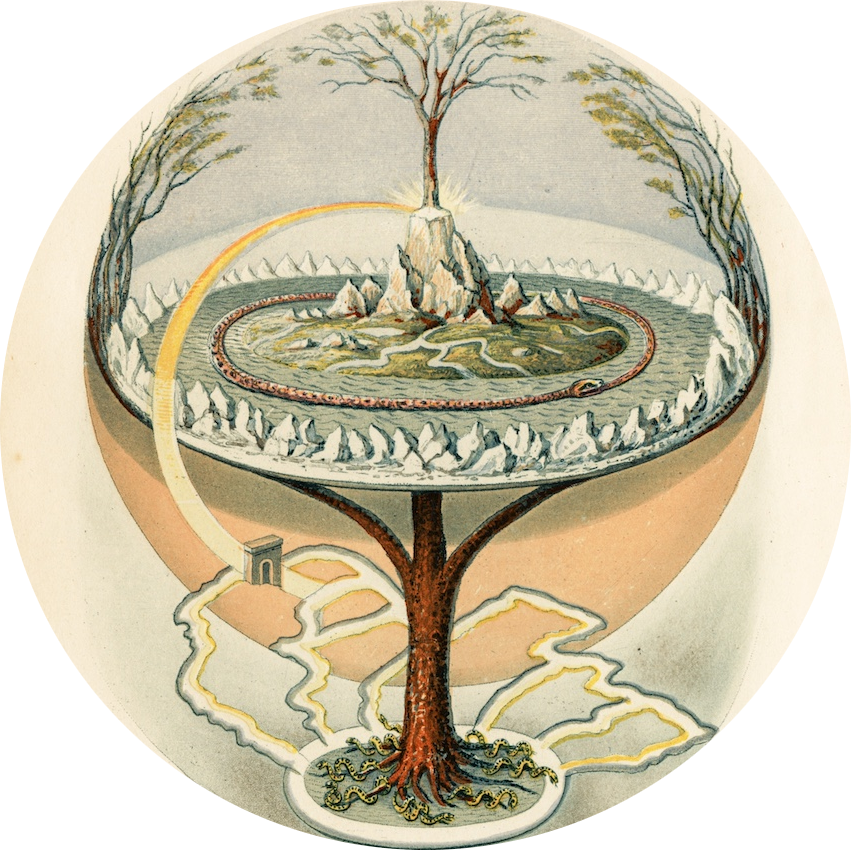Here’s a quick synopsis based on some notes that I jotted down as I was looking over a version of the Enuma Elish that was written in Donna Rosenberg’s World Mythology textbook.
What is the Enuma Elish? Great question! It’s an ancient creation story, dating back to the Babylonians in Mesopotamia, perhaps reaching as far back as 2000 BCE.
https://en.wikipedia.org/wiki/Enūma_Eliš
Everything interesting about this is a credit to Rosenberg’s work and to the Babylonian people that documented the stories on clay tablets so long ago, and everything wrong with it is undoubtedly down to my own poor comprehension. Enjoy!
The Enuma elish
Apsu and Tiamat, the fresh- and saltwater primordial gods that existed before all else, have a mist-baby named Mummu. Two more gods form in the mix of salt and fresh water, notably not referred to as children of Apsu and Tiamat, nor as siblings to each other, but it seems implied. These two are Anshar (male) and Kishar (female). Anshar and Kishar have a child named Anu (god of the Heavens). Anu fathers Ea, who is super-wise and becomes god of the Earth. Eventually he will settle down and marry Damkina, but first he and the rest of his still-living ancestry make a lot of noise and royally piss off Tiamat.
Now-enraged Tiamat tells Apsu to get the offspring in line. Apsu says he prefers the nuclear option, kill ‘em all. Mummu is on board. Tiamat suggests they chill a bit. They do not chill. They choose violence, and they begin preparations to wage a battle.
The offspring gods caught wind of their impending demise and got ready. Clever Ea made a trap, put Apsu to sleep, chained him up, killed him until he was quite dead, imprisoned Mummu (because you don’t just go leaving witnesses, ok?), and Bob’s your uncle. Now for some victory nookie.
Ea and Damkina shack up and have a son named Marduk. Marduk is the wisest and strongest of the gods. Truly, a sight to behold. Ea made Marduk all-seeing and all-hearing, and then also made him bright as the sun.
Time goes on, the kids get rowdy again, Anu is kicking up a tempest and it angers the Old Timers. Kingu is especially perturbed. He calls out Tiamat for letting all of this happen. Tiamat finally sees it Kingu’s way and they get ready to rumble. Kingu is Tiamat’s head commander.
It’s important to point out here, I think, the fact that there still does not yet exist an Earth. Or anything. Except the gods and their drama, I mean. An endless void… and god-drama.
Ea finds out there is another fight coming. He freaks out a bit and asks Anshar for advice. Anshar tells him to be brave and strong and to kill Kingu just like he did Apsu. Ea is apparently super inspired because he sets out to give it the old college-try, realizes on the way that he’s gonna die if he tries to fight this, and promptly chickens out and runs home.
Anshar tells Anu to go next. Same deal, he’s super into the idea, gets scared, funs home. Good thing there’s another boy, right?
They tell Marduk he’s got to help them. He basically says “But… it’s only a girl lol” and then goes on to tell them he’ll do it, but they should recognize his most supreme excellence by making his very words govern the fates. The gods call a meeting and decide they will agree, but only if Marduk can do a magic trick first. Marduk makes a towel disappear - and then, reappear ! if you can believe it!
The gods must have known they were in serious trouble because at this point they agreed to Marduk’s terms. He is now the Supreme God of the Void. Huzzah!
Storm God Marduk outfits himself with awesome armor and weaponry. He raises seven winds and four beasts, and meets Tiamat in battle. (Kingu fled, scared) He defeats Tiamat. Half of Tiamat’s body becomes the Earth, the other half the heavens. They catch Kingu, murderize him, and use his blood to give life to all mankind.


There’s definitely a modern way of viewing this story where Marduk doesn’t come out looking so great, and those are very much the goggles I was wearing when I wrote that text. He reminds me of a sort of stereotypical overconfident toxic male in his early 20s, and he’s just virile enough that his overconfidence didn’t bite him in the end. But the wider context is important too. From what I understand, the Babylonians really got their start when the Amorites forced their way into Sumer and took it over. And being a much more aggressive civilization (or more desperate for resources, probably), they worshipped gods that had similar values. Namely: Take what you need, and get the most you can out of your life on this earth, because it could be over at any moment and you only get one shot. Marduk embodied all of that really well, and obviously the Babylonia value system worked for them in terms of creating a prosperous culture.
To be honest, the contemporary American culture mirrors Marduk’s modus operandi, sadly. Great read, would again.